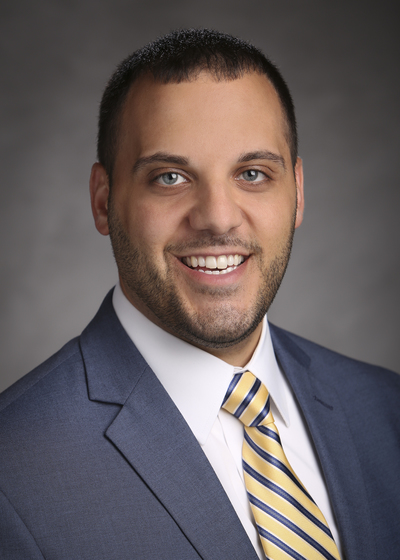Geoffrey Henderson '10

For Geoffrey Henderson ’10, a financial advisor with Northwestern Mutual, educating students is a passion. He’s been working with ACPHS students to help them plan for their financial future. We recently spoke to him about what motivates him.
How did you end up in the financial planning industry?
I was working in construction, running my own business. My now colleague at Northwest Mutual needed some work done. My brother, a pediatrician, was his kids’ doctor and referred him to me. During the process, we got to talking and he asked me what I wanted to do long term. I knew I wanted to make an impact on others and educate. I went in for an interview, but it took me a year and half to say yes.
What is your favorite part of your job?
Talking to people. Building relationships, that’s the best part. Watching people accomplish their goals. Watching a young affluent professional implement the basics of financial planning, get the job, buy a house, get married, have kids. Seeing people accomplish the things that are important to them, putting them on the path so that they achieve their goals.
What are some of the topics you work with students on?
The biggest thing is student loans. Student loans are huge, I can help them understand difference between federal and private. It’s one of the things they don’t think about when they’re looking at full time positions. It’s not always about the salary when considering an opportunity. I help them think about what does it mean for loans, what are the benefits, what are the retirement offerings? It’s about what is the best position fit for the student beyond monetary compensation.
Second big thing is the power of compound interest. I talk about the difference between saving under our mattress versus investing. It doesn’t mean finding the next big thing, it means having good habits, determining the purpose of their savings. Is it short term, mid-term, long-term, or retirement? For instance, saving for a house is different from saving for retirement. I want to give people leverage and options when it comes to savings and investing techniques.
Another area is risk management and protection. It’s a hard conversation, but it would be a huge disservice to avoid the topic. The biggest detriment is the unexpected challenge when you can’t earn and there are people who depend on your salary.
Helping them with their employer sponsored plans. What’s the difference, how much money should we have as savings.
Debt management, looking at the appropriate way for the individual when it comes to planning. It can’t be cookie cutter; you can’t lump yourself in with everyone else. We plan for the individual, knowing what they’re trying to accomplish. It’s about balance, not just blindly saving for retirement. We plan around being able to take vacations and extra things, being able spoil your kids and spoil yourself.
What the best part about working with students?
It’s interesting because it’s all about the education. My main objective is how do we get people to take the opportunity to learn. Their headspace isn’t necessarily there, so how do we get them to understand the importance of having the conversation. I had 5 people in a recent session, but I’m not worried about the numbers. For me, the important thing is how do we get these students to understand the benefits of getting the financial education.
Having immediate impact. It’s an area where a lot of people don’t want to spend time planning because it’s about more than the bottom line. But you get to see their life events happen and build the relationship. It’s about trials and tribulations, the good and the bad. I see them get their residencies or miss out on an internship. But then years later, they’ve turned it around. And I’m there for that.
We give them the right education. If something happens down the road, I know that they and their family will be taken care of because they’ve been working with our team. We’ve had clients pass away prematurely, but they had the insurance, they had what they needed in place to take care of their families.
You incorporate your interest in science into your life as an adjunct chemistry professor—how did you get started doing that?
My father was a high school chemistry teacher and an adjunct professor. After I graduated from pharmacy school, while studying for my boards, I was looking for something to do to start paying for loans. Mohawk Valley Community College reached out to my dad to teach some classes, but he was retired at that point and said I could do it. In 2010 I started teaching general chemistry. I don’t do lecture any longer because I just don’t have the time anymore. I still teach 2-3 lab sections per semester at SUNY Poly in Utica.
It's giving back, its education, it’s feeling like the old person saying, “In my day…”. Every semester I say maybe I won’t go back, and then I do it.

